| The AP-TIP 2022 Fall Conference offers online professional development for AP® math, science, and English teachers. |
AP English
Tuesday, September 13
AP Calculus, AP Statistics
Wednesday, September 14
AP Science, AP Computer Science
Thursday, September 15

| Agenda Overview |
9:00 a.m. - 4:00 p.m. Eastern
Includes a 1-hour lunch period
| Morning Session 9:00 a.m. - 12:00 p.m. |
Afternoon Session 1:00 - 4:00 p.m. |
|
English: Plenary Speaker with Conversation to Follow Math: Self-Contained Workshops per Content Area - Instructional Strategies and Accessibility/Recruiting Focus Sciences: Self-Contained Workshops per Content Area - Science Practices and Student Engagement Focus Computer Science: Plenary Speaker with Conversation to Follow |
English: Rotating 55-min Workshops - Instructional Strategies Focus Math: Self-Contained Workshops per Content Area - Instructional Strategies and Accessibility/Recruiting Focus (continued) Sciences: Self-Contained Workshops per Content Area - Science Practices and Student Engagement Focus (continued) Computer Science: Course-specific Sessions - Performance Task Preparation (CSP) and Early Course Content Review/Sample Projects (CSA) |
| Registration and Topics by Discipline |
If you have a question regarding Fall Conference registration, please contact Wendy Barnes, Program Coordinator,
at (574) 631-4878 or .
Registration
| Registration |
All participants use the link below for registration:
| REGISTER NOW |
| Party | Cost |
| AP-TIP Grant Teachers | FREE |
| AP-TIP Affiliate and Partner Teachers | FREE |
| Non-Program Teachers | $99 per Teacher |
| Payment |
Payments for non-program teacher registrations can be made by check or purchase order and are due by Tuesday, September 14. Cancellations after September 9 will incur a $50 cancellation fee.
The payment or purchase order is to be addressed as follows:
University of Notre DameAP-TIP
107 Carole Sandner Hall
Notre Dame, IN 46556
If you need a copy of our W-9, please reach out to Wendy Barnes via email: or (574) 631-4878.
| Current Cohort Schools |
| Cohort | School | Cohort | School | Cohort | School |
| 8 | Central Noble High School | APECS | Bishop McLaughlin (FL) | Partner | Arsenal Technical High School |
| 8 | East Noble High School | APECS | Cardinal Mooney (OH) | Partner | Crispus Attucks High School |
| 8 | Hanover Central High School | APECS | Cathedral (IN) | Partner | Hammond Central High School |
| 8 | Nazareth Prep | APECS | Cristo Rey Jesuit (IL) | Partner | Morton High School |
| 8 | Norwell High School | APECS | Cristo Rey St. Martin (IL) | Partner | Washington High School (South Bend) |
| 8 | River Forest High School | APECS | Holy Cross (TX) | ||
| 8 | Sheridan High School | APECS | Marian (IN) | ||
| 8 | Washington High School (Washington) | APECS | West Catholic (MI) | ||
| 8 | Wawasee High School | ||||
| 8 | White River Valley High School | ||||
| 9 | Frankfort High School | ||||
| 9 | Munster High School | ||||
| 9 | South Decatur Jr/Sr High School | ||||
| 9 | South Putnam High School | ||||
| 9 | Wood Memorial Jr/Sr High School | ||||
| 10 | Bloomington North High School | ||||
| 10 | DeKalb High School | ||||
| 10 | Fountain Central Jr/Sr High School | ||||
| 10 | Highland High School | ||||
| 10 | Jennings County High School | ||||
| 10 | Riley High School | ||||
| 10 | Rossville Memorial High School |
| Affiliate Schools |
| Cohort | School Name |
| 4 | Argos Jr-Sr High School |
| 5 | Clay High School |
| 5 | Clinton Central Jr Sr High School |
| 1 | Concord High School |
| 2 | Crawford County High School |
| 3 | Eastern Greene High School |
| 3 | Edgewood High School |
| 7 | Gibson Southern High School |
| 4 | Griffith High School |
| 7 | Hebron High School |
| 7 | Jimtown High School |
| 2 | Kokomo High School |
| 7 | La Porte High School |
| 2 | Lawrence Central High School |
| 2 | Lawrence North High School |
| 4 | Lowell High School |
| 5 | Marion High School |
| 4 | Merrillville High School |
| 5 | Michigan City High School |
| 1 | Mississinewa High School |
| 4 | Mooresville High School |
| 5 | Muncie Central High School |
| 5 | New Albany High School |
| 3 | New Prairie High School |
| 1 | Pike High School |
| 7 | Portage High School |
| 4 | Providence Cristo Rey High School |
| 1 | Speedway High School |
| 4 | Twin Lakes High School |
| 2 | Whiteland Community High School |
| 6 | Whiting High School |
English
| Morning Session |
Opening
Aubrey Ludwig, College Board
Changes in English as Addressing Equity and Access in Reading and Writing
Plenary Speaker
Dr. Micahael Macaluso, University of Notre Dame
Session 1: "Developing Life-Long Readers AND AP Test-Takers"
Session 2: "Methods for Inclusive Literary Instruction"
| Afternoon Sessions by Course |
AP English Language and Composition
Chancy Smith
Tackling Texts: What tools can we give our students to use next time they feel a text is "too difficult" to read?
We will work through strategies to tackle these texts and find other pieces we can use to sharpen these tools throughout the year.
Kacie Smith
Real, Relevant, Relateable Anchor Text Choices: How to pick pieces that will serve as anchor texts for your class and where to find them.
For experienced teachers, we will look at how to thematically relate these anchor texts to other pieces used in class.
AP English Literature and Composition
Lisa Boyd
Purpose-Driven Reading: AP Classroom topic questions are not just assessments OF students' learning; they can be powerful tools FOR students' learning.
We will explore how to use AP Classroom questions to guide our students to become purposeful readers.
Brandon Abdon
“…and Composition: Writing Process in AP Literature”
This interactive session will explore a part of AP Lit that is often easy to gloss over, often difficult to include, but always essential to student growth. Attendees will explore essentials of fostering writing processes and how to balance them with the demand of the AP Literature course
Both Courses
Chris Judson
Teaching Students to Guide Their Own Questions (QFT)
Afternoon Sessions by Course
Math
| Morning Sessions by Course |
Calculus

Statistics
Making Sense of Statistical Inference
We'll start by exploring two simulation activities--one for sampling and one for experiments--that help students unravel the logic of confidence intervals and significance tests, as well as the appropriate scope of inference, early in the AP Statistics course. Then we will examine how these simulation-based methods connect with the traditional inference procedures that students are expected to master in the second half of the course.
| Afternoon Sessions by Course |
Calculus
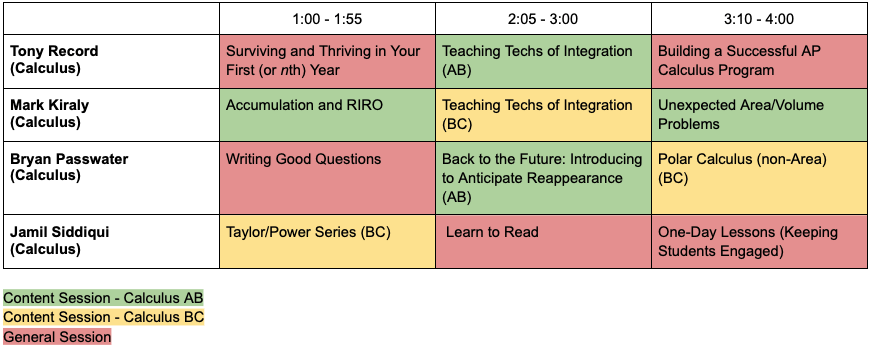
Statistics
Statistics for Good: The Data are Trying to Tell Us a Story
How can we engage students in using statistics for the greater good? We’ll investigate two compelling studies involving safe drinking water and possible discrimination in AP Calculus recommendations by high school counselors that encourage students to look for the story behind the data.
Enhancing Teaching and Learning with AP Classroom
There is a plethora of resources in AP Classroom: AP Daily videos, Topic Questions, Progress Checks, the Question Bank, My Reports, University Faculty Lectures, and more. Let’s share strategies for leveraging these potential high-impact resources to maximize student learning.
Five Applets that Empower Statistical Thinking
Several challenging statistical concepts--sampling distributions, regression models, confidence levels, the importance of inference conditions, and the relationship between Type I error, Type II error, and power--can be illuminated using freely-available applets. Following hands-on exploration of each applet, we will discuss ideas for effective implementation.
Science
| Keynote Session |
This year's Fall Conference will feature a keynote session from 9:00 - 10:00 a.m. on the “Question Formulation Technique (QFT)” presented by the Right Question Institute.
"Spark Curiosity, Fuel Scientific Inquiry: Teach Students to Ask Their Own Questions" with Katy Connolly
Questions are an essential tool that scientists and researchers of all kinds use to fuel innovation and advance knowledge in their field. And yet, only 27% of college graduates say that college taught them how to ask questions. How can we better equip our students–starting in high school–with this key skill needed for college, career, and lifelong learning? Join us to learn the Question Formulation Technique (QFT), a simple, powerful strategy that teaches all students how to ask, improve, and pursue their own questions. View educational research, actively experience the QFT protocol around a topic of interest, explore classroom applications across biology, chemistry, environmental science, and physics, and hear from a high school science teacher on how she has integrated the QFT in her classroom. Leave ready to immediately implement the strategy.
Katy Connolly is the Education Program Coordinator at the Right Question Institute (RQI), a nonprofit dedicated to strengthening democracy by building people’s capacity to ask better questions. Katy collaborates with educators across the United States and beyond to learn from their innovative work and develop new resources. Katy also designs and facilitates professional learning for educators, coordinates RQI's online courses, and manages the Right Question Institute's three-year grant project with the Library of Congress. She has presented at national conferences such as the National Science Teaching Association (NSTA) and the Association of Independent School Librarians (AISL) conferences and with organizations such as the New York Metropolitan Library Council (METRO). Katy graduated from Boston University with a bachelor’s degree in English education, where she spent most of her time teaching and tutoring high school students.
| Conference Theme |
“Exploring the Science Practices and Building Student Engagement”
| Topics by Course |
AP Biology
College Board Consultant, Ruth Gleicher
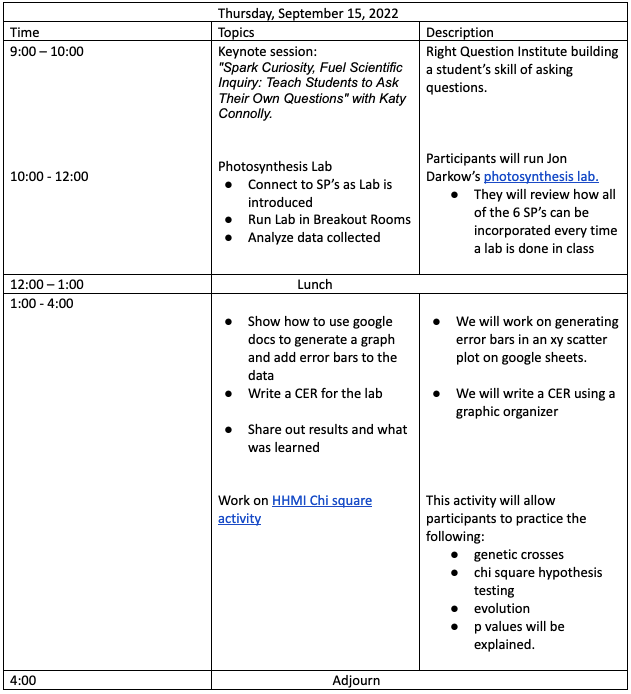
AP Chemistry
College Board Consultant, Alice Putti
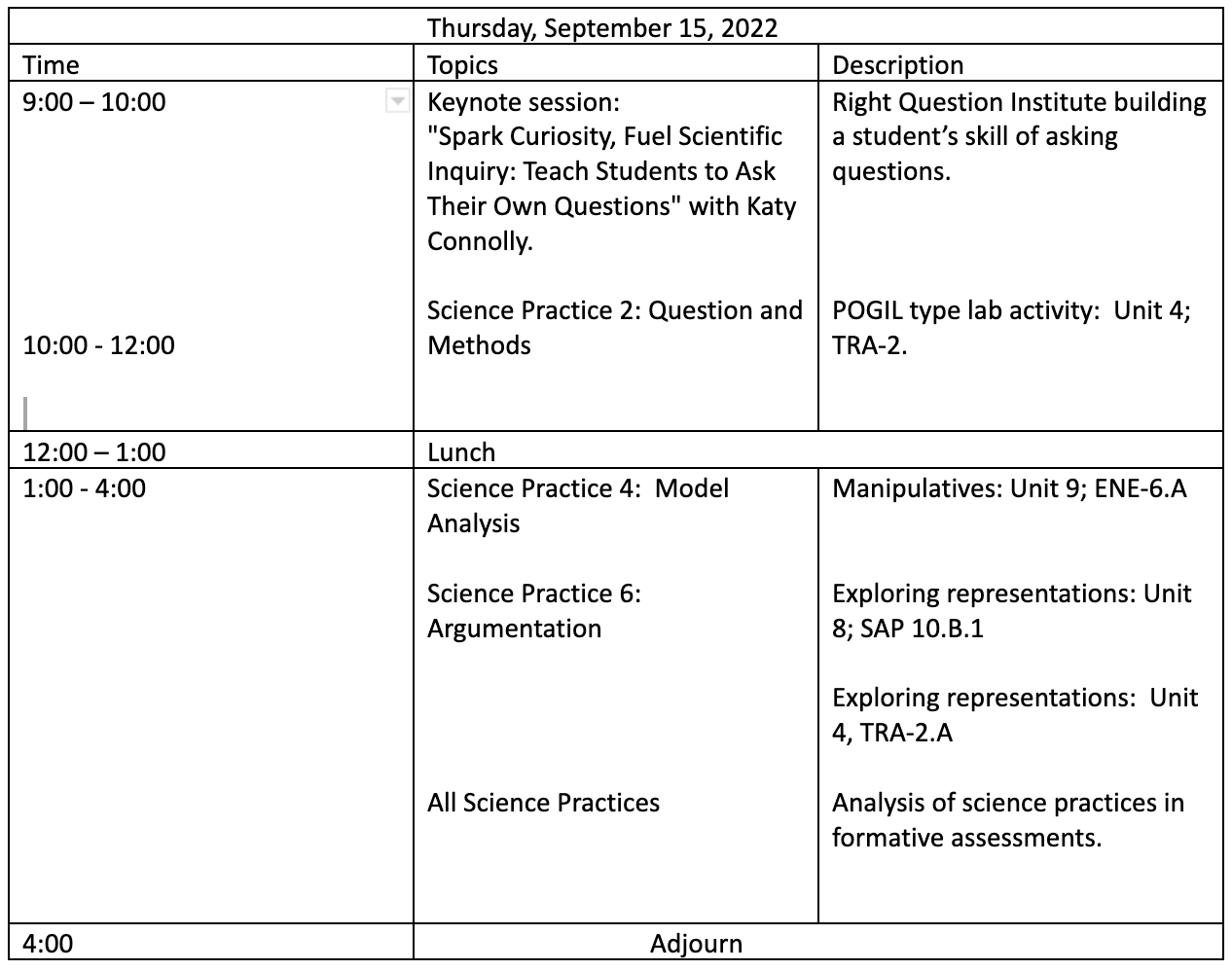
AP Environmental Science
College Board Consultant, Courtney Mayer
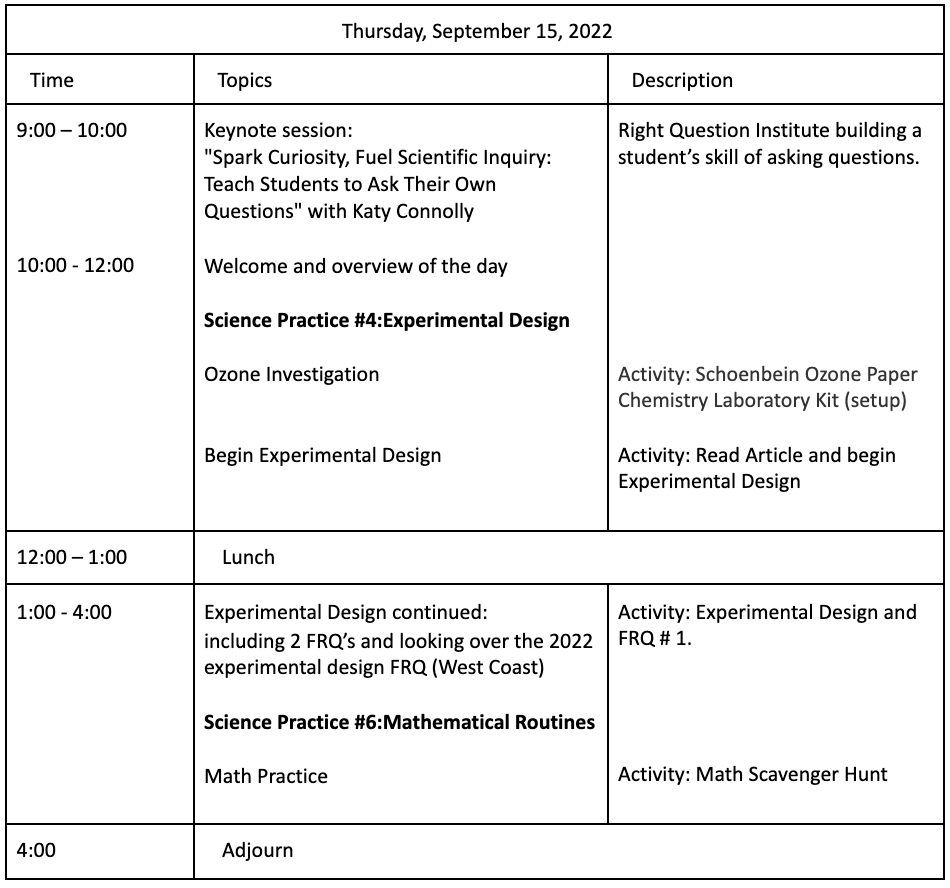 AP Physics 1
AP Physics 1
College Board Consultant, Oather Strawderman
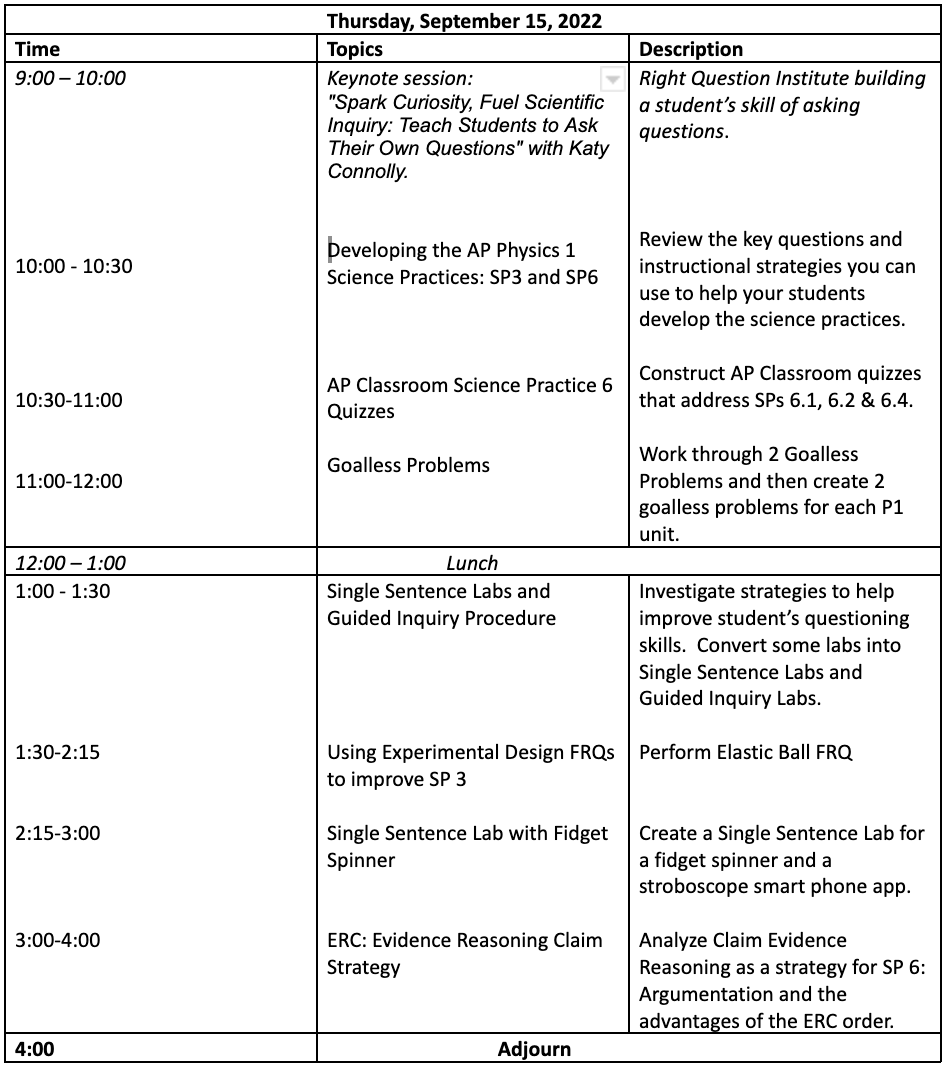
Computer Science
| Topics by Course |
Computer Science Principles
Gina McCarly
9:00 - 12:00: Teaching Computer Science Principles
1:00-1:50: Preparing for the Create Performance Task
While examining the performance task requirements and scoring guidelines, this session is aimed at helping teachers prepare students for the Create PT. The written response requirements will be reviewed as the lessons learned from the exam reading are considered.
2:00-2:50: Preparing for the Create Performance
While examining the performance task requirements and scoring guidelines, this session is aimed at helping teachers prepare students for the Create PT. The written response requirements will be reviewed as the lessons learned from the exam reading are considered.
3:00-3:50: Student Journaling with Interactive Notebooks
Interactive notebooks can be a wonderful student resource in your CSP classroom. This session will focus on using interactive notebooks as a tool for vocabulary reinforcement and the importance of using journaling in preparation and review for assessment. Join Gina for inspiration and journaling ideas.
Joe Hoffert
1:00-1:50: Representing Data in (and out of) a Computer
There are many examples of representing data or information. Some representations have been used for centuries long before the advent of computers. This session will briefly discuss different representations of information that have been used. We'll then focus on the basics of how integer numbers (e.g., 1, 2, 3.) are represented in a computer.
2:00-2:50: Representing Non-Numeric Data in a Computer
This session explores how non-numeric data (e.g., text, pictures) can be represented in a computer. We'll discuss some of the standards used (e.g., ASCII, RGB values) and why they are important.
3:00-3:50: Representing Complex Data in a Computer
This session explores how more complex data, (e.g., non-alphabetic languages, audio, video, real/floating point numbers) can be represented in a computer. We'll discuss how the complex data can be compactly represented in a computer and why that's important.
Computer Science A
Ria Galanos
9:00-12:00: Teaching Computer Science A
1:00-1:50: Preparing for the Free Response: Question #2
2:00-2:50: Preparing for the Free Response: Question #3
3:00-3:50: Preparing for the Free Response: Question #4


